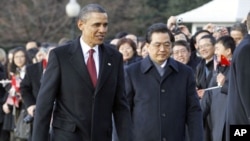U.S. President Barack Obama has invited some of the country's top business leaders to meet with Chinese President Hu Jintao on Wednesday in an effort to help promote American exports to the world's most populous nation.
Chief executives from such well-known U.S. companies as Microsoft, the Goldman Sachs Group, General Electric, Boeing and Coca-Cola are among 14 that Mr. Obama invited to meet with Mr. Hu, as the two leaders opened their summit in Washington. The Chinese president brought along four key business executives representing Chinese computer technology, home appliance, automotive parts and investment companies.
During their meetings, Mr. Obama and Mr. Hu face disagreements on human rights and currency valuation issues. At the same time, the White House is seeking to focus on the "important economic relationship" between China and the U.S.
Creation of more U.S. jobs is particularly important to Mr. Obama, as his country has struggled to reduce unemployment. Nine percent or more of the U.S. workforce has been jobless for 20 straight months.
China and U.S. trade totals about $400 billion annually. But China enjoys a wide surplus, a gap that may have hit $270 billion last year.
Numerous U.S. companies are seeking to increase their foothold in China, none more so than General Electric. The international conglomerate is signing a number of deals with China this week involving energy, rail and aviation manufacturing, deals that GE thinks will boost its profits and save U.S. jobs.
Some U.S. firms say that their initial investments in China have proved difficult, complaining that Chinese government regulations favor China's firms and that protection of intellectual property laws is weak.
Some Chinese firms are anxious to invest in U.S. operations as well. One executive, Lu Guanqiu, of the automotive parts firm Wanxiang Group Along, said the U.S. welcomes Chinese firms because "we're solving their employment problems."
Top US, Chinese Business Leaders Meet With Obama, Hu




